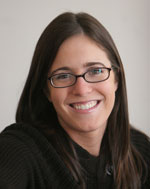Twenty Something / Christina Capecchi
Reluctant leaders,
divine surprises
and a resigning pope
 “It was 1415,” my friend corrected her husband over a dinner of wings and beer on that stunning Monday when Pope Benedict XVI announced his resignation.
“It was 1415,” my friend corrected her husband over a dinner of wings and beer on that stunning Monday when Pope Benedict XVI announced his resignation.
We were discussing, like so many across the globe, our newly acquired bit of papal trivia—the last pope to resign.
Over the course of the day, there had been a shuffle of years and a scuttle for experts. Casual observers scrolled through Wikipedia’s list of 265 popes, one of the more vast and colorful leadership records—a 20-year-old pope, a one-month papacy, a 32-year papacy, two-year gaps between popes, and one man who served three separate terms.
It was a lot to process. Many Catholics had not known papal resignation was even an option. Many had never heard of Pope Gregory XII, the latest pontiff to step down six centuries ago.
Amid all the incoming data, the commentary that struck me most came during an “NBC Nightly News” interview with longtime Vatican correspondent John Thavis. In addressing the papal election process, he pointed out that no cardinal in the secret conclave would nominate himself, nor would it be acceptable for a cardinal to mobilize a group of friends to make his case.
“You don’t campaign,” Thavis said.
What a refreshing concept for our campaign-weary times. It’s not just political fatigue. It’s the way social media has turned daily life into one carefully edited, sepia-toned commercial.
This process is purer—no lobbying, no fundraising, no elbow rubbing, no back scratching. Just earnest discussion, fervent prayer and the quaint belief that an inspired selection doesn’t begin with the candidate raising his own hand.
Election, therefore, can be a shock, welcomed or not. “As the trend in the ballots slowly made me realize that—in a matter of speaking—the guillotine would fall on me, I started to feel quite dizzy,” Pope Benedict XVI once joked.
God surprises and challenges us. What you want and what your family or Church needs may be two different things. The discrepancy between how we view ourselves and how others view us can produce unexpected requests.
The key, I’m learning, is to allow yourself to be startled and stretched, to sit in the invitation for a moment, to let it wash over you before hatching a list of reasons to decline.
My mom leads a weekly Bible study at a retirement community, and was recently compelled to enlist one of the seniors to say a closing prayer. “I thought, ‘These folks must be tired of hearing my voice,’ ” she told me. “I felt nudged to ask Blytha.”
So Mom gently invited the 88-year-old widow with short gray hair and an introverted disposition to wrap up their gathering, and Blytha led a beautiful prayer, seamlessly drawing on the day’s Scripture and comments from several neighbors.
“You have a knack for this,” Mom later told her.
Blytha chuckled. “It’s funny you say that. I used to avoid going to prayer meetings because I was afraid of being asked to pray aloud.”
Now the widow enjoys leading prayer, and has become an ambassador for the group.
At every age we are evolving, discovering new gifts from the God who elevated a peasant girl and recruited flawed disciples.
This used to puzzle me, but now I understand what consolation it offers: Spiritual life isn’t a meritocracy. It’s not based on framed degrees or LinkedIn endorsements. It’s not earned by homemade cookies, handwritten notes and social capital.
It’s about shedding our own ideas and stepping into unlikely roles, prodded by someone who sees something we do not, trusting in new graces.
(Christina Capecchi is a freelance writer from Inver Grove Heights, Minn. She can be reached at www.ReadChristina.com.) †
 “It was 1415,” my friend corrected her husband over a dinner of wings and beer on that stunning Monday when Pope Benedict XVI announced his resignation.
“It was 1415,” my friend corrected her husband over a dinner of wings and beer on that stunning Monday when Pope Benedict XVI announced his resignation.